Why Do Social Comparisons Affect Us So Much? – Being Parents
We are constantly comparing ourselves to people in our environment, to our social networks, to public figures and even to fictions.
In normal times, the general opinion on social comparisons tends to be negative, although they should be avoided as much as possible. But what if we tell you that social comparisons are part of the character of being human?
Why do we need to compare ourselves with others?
Leon Festinger, author of Social Comparison and Cognitive Dissonance Theory, argues that people need to assess our opinions and abilities. In other words, people need to know that we are consistent and that our opinions and choices are valid.

According to psychologist Joel Feliu, people have started a process of comparing with other people in an attempt to gain certainty without being able to find another way to verify the validity of our opinions and skills. So how do social comparisons affect us?
Even though the options are easy and the choice seems clear, we often tend to trust the opinions of others. That is, we trust their opinion more than ours to know what to say, do or think.
However, Feliu stresses that social comparisons are not random, but that we tend to make them with people who seem closer to us. Therefore, knowing that there are more similarities with the other person, we rely more on them to assess our opinions and abilities.
All this thinking leads to the concept of group uniformity. The fact that we need reliable opinions about those who we think are like us translates into a desire for group uniformity. That is, the desire to want to be more like others and for others to be more like us.
What is cognitive dissonance?
What happens when our attitudes and opinions do not match those we consider close to us? According to Festinger, when social comparisons show divergences, then cognitive dissonance occurs.
This dissonance would be at the origin of psychological distress, which would lead us to modify our decisions, our opinions, our attitudes and, finally, unconsciously, our cognitive system.
Social comparisons: how harmful are they?
Now that we know that social comparisons are part of human character, how do we compare to others?
Comparing ourselves to others will affect us very differently depending on how we mean that comparison. How we assess our situation against that of another person can seriously affect our self-esteem and deteriorate our autonomy.
On the one hand, we need to understand that we all have a unique life situation resulting from different experiences. That is, to understand that the events that took place until the conformity of your current state and that of the other person are very different.
Indeed, associating your skills with another person’s situation can actually hurt your self-esteem.
On the other hand, with the saying “ the habit does not make the monk ”, it must be understood that appearances are deceptive. Susan Biali, physician and wellness specialist, emphasizes that it is important not to compare the “outer” sides of others to your “inner” sides.
With the arrival of social networks, it is very common to compare our life to that of others by consulting their Facebook or Instagram profile when after all, we only have their photos as a source.
Social comparison as a source of inspiration
Each of us is unique and we have our own strengths and weaknesses. Moreover, it is true that, if we constantly compare ourselves to others, we will assign demands that are foreign to us. However, there is a healthy way to use social comparisons: inspiration.

Seeing how others are progressing and achieving their dreams when you still have a lot to do is really frustrating and can even generate a lot of anxiety. When you compare yourself to others, convert that frustration or urge of not being able to get what they have into motivation.
Therefore, to compare yourself to others, you should always focus on improving. Look at these people from another perspective, as a role model or goal to follow to help you achieve your goals. Analyze what they have done to get what they have now and motivate yourself by saying, “If they could do it, so could I.”










